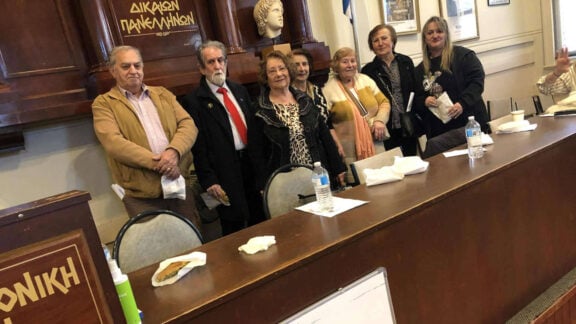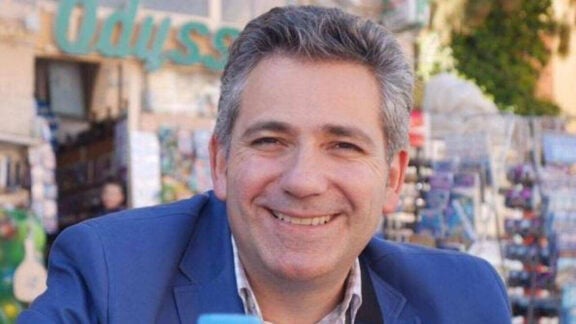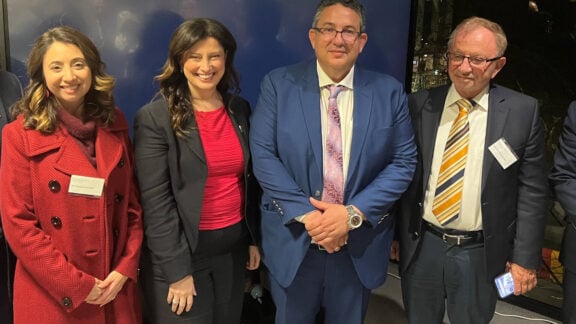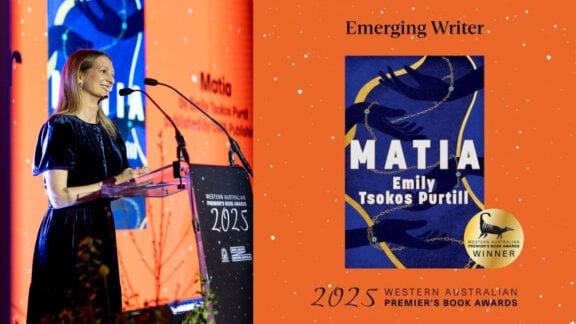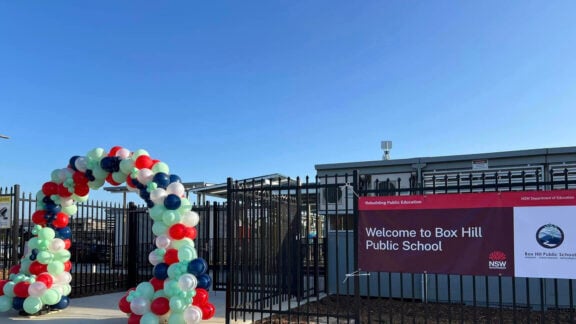Prominent businessman George Savvides, was recognised last Friday night in Melbourne with the Faith & Work Award by the Ethos Centre for Christianity and Society, an award that is given every year to an Australian who has shown an exceptional contribution to society, by integrating their faith with their work.
With a career spanning over 30 years in management and board experience, the Australian of Greek Cypriot descent, has served as the head of three healthcare companies whilst also dedicating 18 years of voluntary service to the boards of World Vision Australia and World Vision International, before taking on his current role as Chair at SBS.
Originally from Sydney, Savvides moved to Melbourne with his wife and young family in 1992, for his first role as CEO at the global healthcare company Smith & Nephew. That was followed by his appointment to Sigma Pharmaceuticals and then finally Medibank Private which he listed on the ASX during his 14 year term.
The Faith & Work Award acknowledged integrity and engagement in his professional life, and his people-focused leadership which aligns with his personal faith, respect for all individuals, their beliefs, and values.
“Leadership is service, its personality is humility, its tone is respect and kindness. Leadership is also a force for renewal and relevance that changes attitudes and makes the impossible achievable,” George Savvides told Neos Kosmos in an interview about his latest recognition.
Delving into his time as CEO in various companies he tells us that he discovered a consistent theory of what works and what doesn’t within contemporary leadership. “Leaders need to show up in such a way that they engage the hearts and minds of their employees and strive to build a strong high performing culture.”
His Greek heritage, deeply rooted in faith, played a significant role in shaping his values, growing up. He admired the way his parents, committed members of the Greek Orthodox Church in Sydney, lived out their beliefs by generously helping neighbours and upholding family values within the broader community.
However, it was a pivotal incident from his teenage years that would motivate him to further explore the teachings in the Bible.
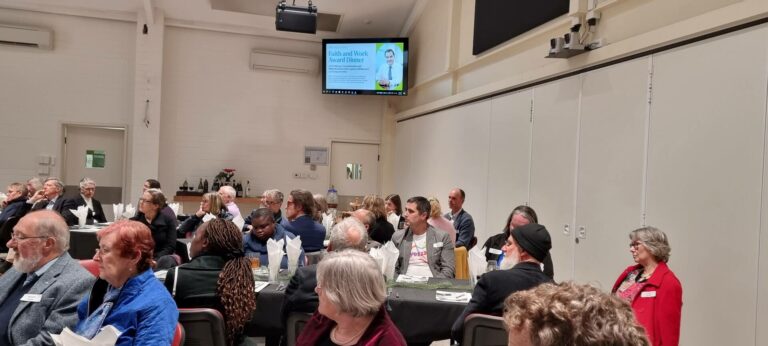
At the age of 14, during his first visit to Cyprus to connect with his grandparents and cousins, in 1970, his father took him to the St Andrew Monastery at Salamis on the country’s northeastern coast.
“We walked away from the excavation site of the Roman ruins and came to a metal grate in the path….. my father unlocked it to reveal an opening like a shaft dropping down into a cave-like room, we climbed down a ladder into a first century underground church situated away from where the Roman guards may have been.”
It so happened that it was the same place mentioned in the New Testament, about apostles Barnabas’ and Paul’s mission in Cyprus. which he was reading at the time in the small red Gideon’s Bible he had received earlier that year from his high school.
It all came alive to him and that experience profoundly impacted him. “It was the most wonderful gift my father ever gave me and a gift that he had also enjoyed when he was a boy.”
Upon his return from that journey, George Savvides became involved in a local church, and later, he pursued and completed his degree in Industrial Engineering at the University of New South Wales. His career choices reflected a desire to put his faith into practice as an engineer, leading him to his first job at a company that operated factories for workers with significant disabilities. Here, he says he learned valuable lessons about empathy, courage, and the power of the human spirit.
“Despite their challenges this was a very passionate workforce that just wanted a chance to make a valued contribution.”
In reflecting on the moments that shaped his leadership style, Savvides highlights the time he spent on the factory floor during his industrial engineering training.
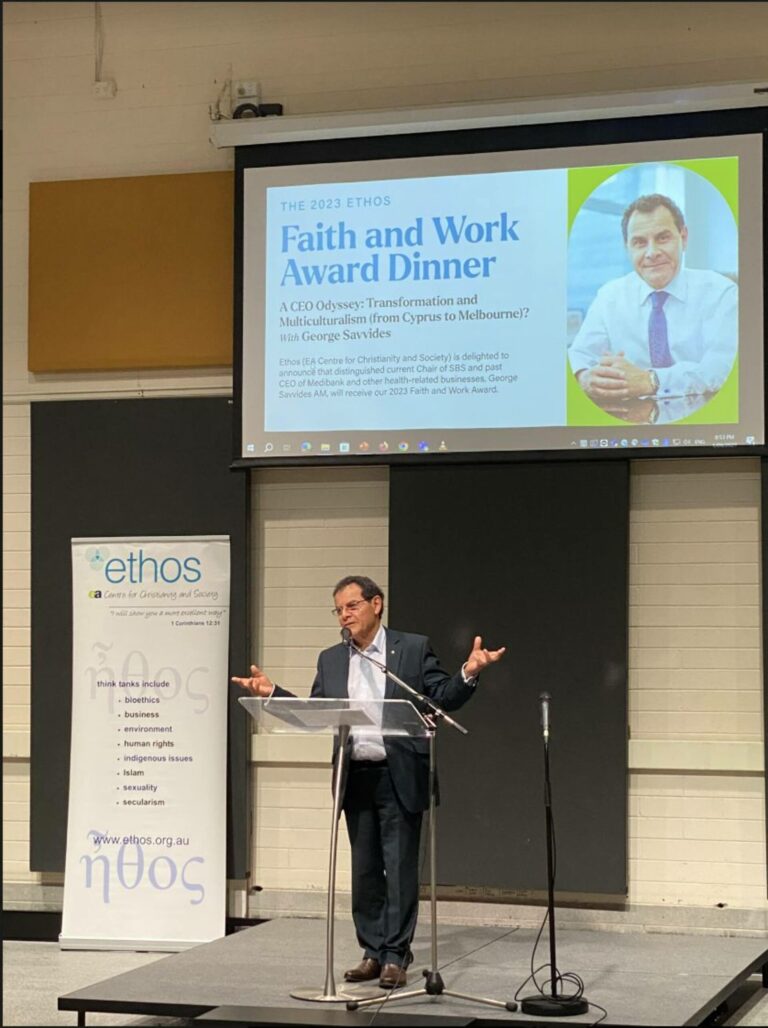
His approach had been to understand the concerns of the workers.
“In modern management theory this is called servant leadership, empathy and deep engagement with the workforce to learn about what needs to change and to ensure workers that their roles, ideas and aspirations are valued. This was the type of leadership I understood from my reading of Jesus in the Bible so for me it was a confirmation that Faith and Work can be good partners in sharing the character of leadership for organisations.”
By connecting with the heart of the workforce, Savvides saw that he could positively influence the company’s culture, ultimately leading to high performance and acceptable shareholder returns.
“I have friends in all of the Abrahamic religions, Christian, Jewish, and Islamic, , and also in the Hindu and the Buddhist faiths. There are some themes they have in common. One of these common themes is that life isn’t an accident, there is a purpose to it.
“That intention had me asking: ‘What is the purpose of my life in this intended universe? What obligations do I have?’ My understanding over time was that the ‘I’ is too strong in our lives, and we need to check more about the ‘We’, and look at the needs of others. That kind of mindset helps us understand what our purpose is. We’re here to do life with family and colleagues, workmates and neighbours, in a way where we’re investing in the greater common good, not just our own self interest.”
Australia is one of the most multicultural countries in the world, he continues, and much of that multiculturalism is founded on multi-faith traditions.
“What we believe shapes our worldview and identity. Through my work at SBS I have seen the importance of respecting cultural diversity as it builds a pathway to inclusion and belonging.”
In SBS we serve Australians in 60 languages, Savvides adds. “That is unique in the world. Nearly half of our population has a heritage from overseas. And it’s a very diverse language heritage as well. Our role is to make people feel at home to feel included. This also aligns with my beliefs that we should treat everyone as equals. It reflects the ethics and beliefs that come from many religions, not just the Christian religion.”
“When we show up at work or school our worldview energises our contribution and defines our purpose. So if your religious beliefs promote kindness and respect to those around you, compassion to those suffering or sick, or provides deep concern, justice and fairness, I say bring that to work. Most of the major religions would encourage such empathy toward the common good.”
Belief often informs strategic choices, Savvides concludes.
“It emboldens us to stare into seemingly unsolvable problems in our world today, like climate change, with hope and moral conviction, strive for the common good and divine purpose as we try to look after the earth we have been asked to steward.”



